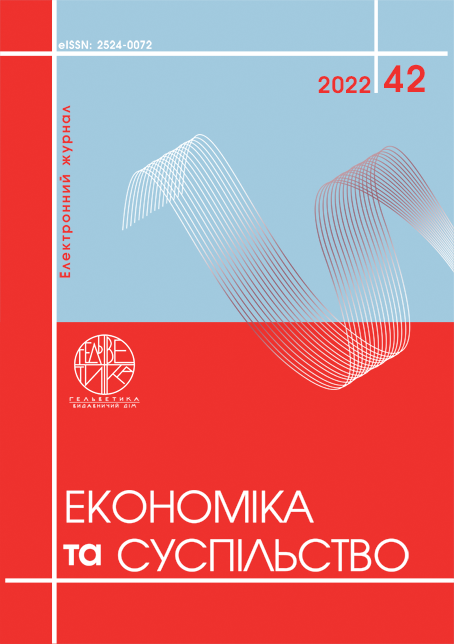TYPING OF CONSUMERS BASED ON RESEARCH OF FACTORS OF CONSUMER BEHAVIOR OF FUTURE MANAGERS
Abstract
The article is discus the contemporary issues of estimate of economic behavior of future managers, which are determined by the psychological characteristics of the personality and the quality of economic decisions taken throughout life. Consumer behavior is an interdisciplinary concept and is considered as an organized form of activity aimed at meeting the actual needs of a person through the search for the necessary goods and services, choosing the best alternative and organizing the procedure of socio-economic exchange. The methodological tools for diagnosing various aspects and factors of consumer behavior of future managers are: the methodology "Consumer behavior of students" by A. Savchenko and S. Khtei, the methodology "Personal decision factors" (LFR-25) by T. Kornilova, the methodology "Scale of monetary beliefs and behavior "(A. Fernham); methodology "Satisfaction with life" (N. Melnikova), cluster analysis. The aim of the research is to typify the subjects of consumer behavior on the basis of the personal factors of consumer behavior of future managers. According to the results of the cluster analysis, two groups of consumers were identified. The main criteria for consumer typification are manifestations of personal rationality and attitudes towards money in consumer behavior. The group "Rational consumers" includes consumers who have high manifestations of personal rationality and the prevailing attitude towards the rational distribution of money. The group "Money-obsessed consumers" includes consumers who have high manifestations of money obsession, money power, and inappropriate behavior with money. According to the results of a survey of future managers, 26.2% are "subjectively rational" or inclined to rational economic decisions, and 21.5% of the respondents are "obsessed with money". Consumers included in the group of "Rational Consumers" are rational in their consumer behavior, carefully analyze product alternatives, are not prone to impulsive and thoughtless purchases, and reasonably make consumer decisions. Consumers of the second group "Money-obsessed consumers" are more irrational in consumer behavior, do not tend to rationally allocate funds, do not always carefully analyze product alternatives, are prone to impulsive and rash purchases, may take an unreasonable approach to consumer decision-making, do not pay attention to access, perceive money as an instrument of power and influence and as a guarantee of their own stability. The key characteristics of the consumers of each of the groups are determined.
References
Савченко О.В., Хтей С. Методика діагностики аспектів споживацької поведінки студентів. Організаційна психологія. Економічна психологія. 2020. № 4(21). С. 96–109.
Корнилова Т.В. Личностные факторы принятия решений (ЛФР-25). URL: https://sites.google.com/site/test300m/lfr
Furnham, A. (1984) Many sides of the coin: the psychology of money usage. Personality and Individual Differences, vol. 5, pp. 501–509.
Климчук В.О. Кластерний аналіз: використання у психологічних дослідженнях. Практична психологія та соціальна робота. 2006. № 4. С. 30–36.
Чернявский А.Д. Рациональность и иррациональность в экономической науке. НАУКОВЕДЕНИЕ. Интернет-журнал. 2014. № 4(23). С. 1–17.
Savchenko О. Consciousness and reflection in the basis of psychological theorizing. Psychology & society. 2018. Vol. 3-4. Р. 67–89.
Карамушка Л., Креденцер О., Паршак О. Основні тенденції розвитку психології грошей у зарубіжній та вітчизняній психології. Організаційна психологія. Економічна психологія. 2020. № 4 (21). С. 49–56.
Канеман Д., Словик П., Тверски А. Принятие решений в неопределенности: правила и предубеждения. Харьков : Гуманитарный Центр, 2005. 175 с.
Яновська С.Г., Криворучко С.М., Самохін О.О. та ін. Особливості задоволеності життям людей з різним ставленням до грошей і власної жадібності. Вісник Харківського національного університету імені В.Н. Каразіна. 2019. № 66. С. 47–53.
Furnham, A. (1984) Many sides of the coin: the psychology of money usage. Personality and Individual Differences, vol. 5, pp. 501–509.
Savchenko O.V., Htej S. (2020) Metodika dіagnostiki aspektіv spozhivac'koї povedіnki studentіv [Methods of diagnosing aspects of consumer behavior of students]. Organіzacіjna psihologіja. Ekonomіchna psihologіja, vol. 4(21), pp. 96–109. (in Ukrainian)
Kornilova T. V. Lichnostnye faktory prinjatija reshenij (LFR-25) [Personal decision-making factors (LFR-25)]. Available at: https://sites.google.com/site/test300m/lfr (in Russian) (accessed 22 September 2022).
Furnham, A. (1984) Many sides of the coin: the psychology of money usage. Personality and Individual Differences, vol. 5, pp. 501–509.
Klymchuk V.O. (2006) Klasternyi analiz: vykorystannia u psykholohichnykh dos-lidzhenniakh [Cluster analysis: use in psychological research]. Praktychna psykholohiia ta sotsialna robota, vol, 4. pp. 30–36. (in Ukrainian)
Chernjavskij A.D. (2014) Racional'nost' i irracional'nost' v jekonomicheskoj nauke [Rationality and irrationality in economics] NAUKOVEDENIE. Internet-zhurnal, vol. 4(23), pp. 1–17. (in Russian)
Savchenko O. (2018) Consciousness and reflection in the basis of psychological theorizing. Psychology & Society, vol. 3-4, pp. 67–89.
Karamushka L., Kredentser O., Parshak O. (2020) Osnovni tendentsii rozvytku psykholohii hroshei u zarubizhnii ta vitchyznianii psykholohii [The main trends in the development of the psychology of money in foreign and domestic psychology]. Orhanizatsiina psykholohiia. Ekonomichna psykholohiia, vol. 4 (21), pp. 49–56. (in Ukrainian)
Kaneman D., Slovyk P., Tversky A. (2005) Pryniatye reshenyi v neopredelennosty: Pravyla y predubezhdenyia. [Decision making under uncertainty: rules and biases]. Kharkov: Humanytarnyi Tsentr, 175 р. (in Russian)
Ianovska S.H., Kryvoruchko S.M., Samokhin O.O. ta in. (2019) Osobly-vosti zadovolenosti zhyttiam liudei z riznym stavlenniam do hroshei i vlasnoi zhadibnosti [Features of life satisfaction of people with different attitudes towards money and their own greed]. Visnyk Kharkivskoho natsionalnoho universytetu imeni V.N. Karazina, vol. 66, pp. 47–53. (in Ukrainian)
Furnham A. (1984) Many sides of the coin: the psychology of money usage. Personality and Individual Differences, vol. 5, pp. 501–509.


